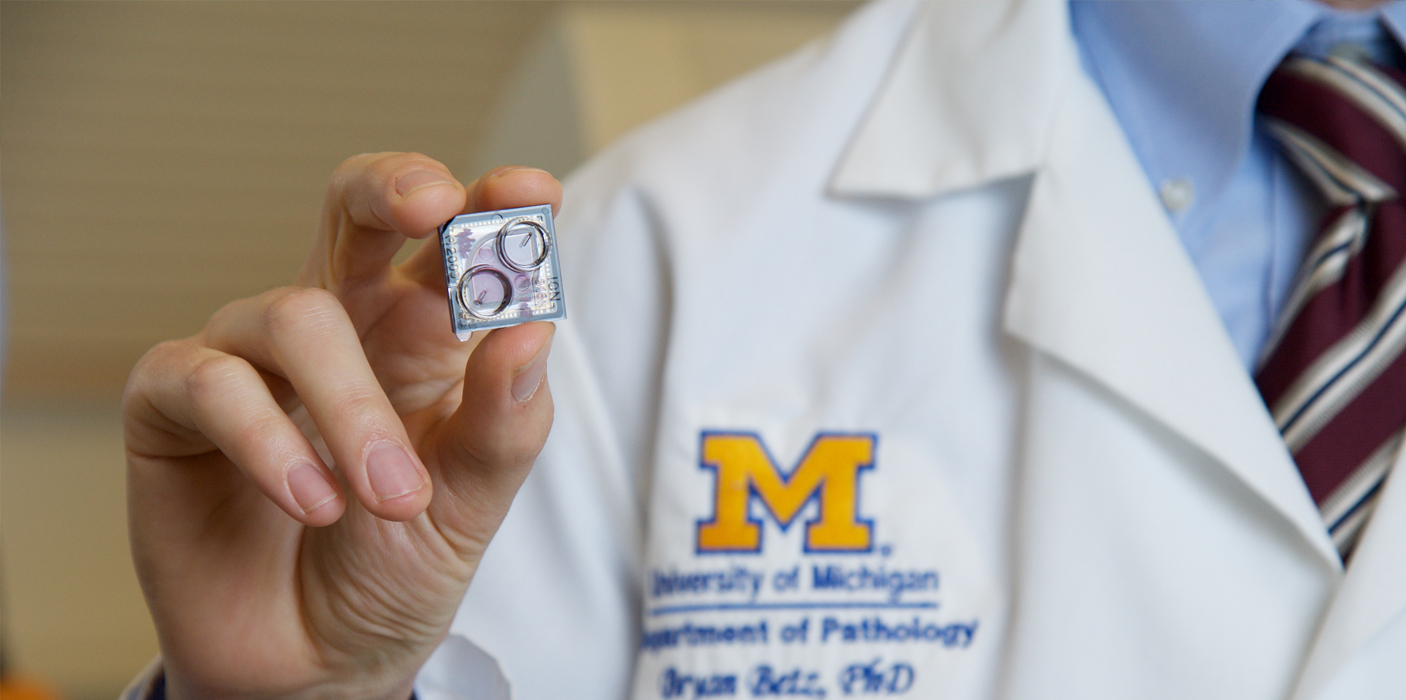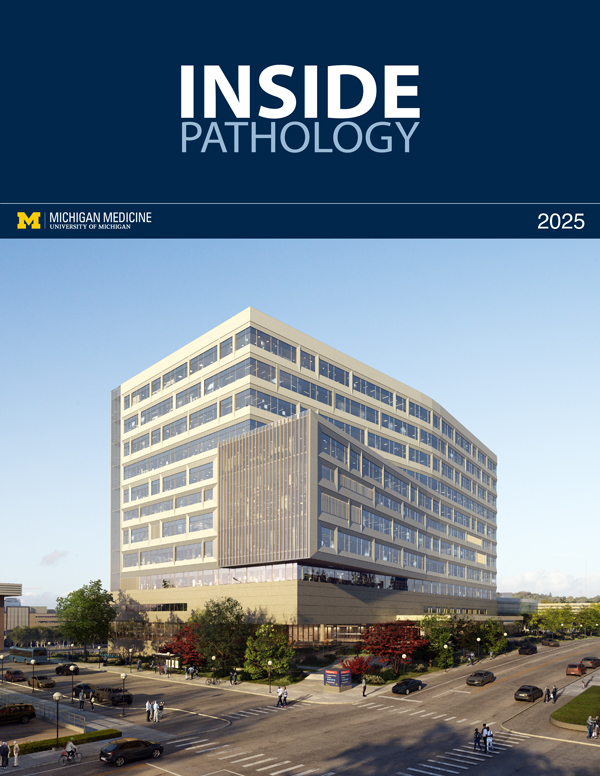

During the course of the one year program, Molecular Genetic Pathology (MGP) fellows will participate in the day to day operation of molecular genetic pathology laboratories performing and interpreting a variety of clinical tests and will gain experience with diagnosis, management, treatment, and counseling of patients with genetic disorders during rotations through Medical Genetics clinics. In addition, trainees will attend didactic sessions with the supervising medical staff, graduate level courses in Human Genetics, journal clubs, and laboratory conferences. Trainees will present relevant laboratory findings at clinical conferences and will function as a clinical consultant in Molecular Genetic Pathology for the Medical Staff of the University of Michigan Health System.
The MGP program is open to trainees who have completed either an ACGME-accredited program in Pathology or an ACGME-accredited program in Medical Genetics. The overall duration of the program in 12 months; however, there is a 2 month block of time during the course of the fellowship which will differ, depending upon the trainee’s background. The remaining 10 months of the program will be identical for both types of trainees.
Fellows entering the program as pathologists will actively participate in the diagnosis, management, genetic counseling, education, and treatment of adult and pediatric patients and families with, or at risk for, inherited disease during a two month clinical rotation with the Medical Genetics and Cancer Genetics programs in the Division of Molecular Medicine and Genetics in the Department of Internal Medicine. Over 4000 patients are seen annually for clinical genetic services at the University of Michigan, with over 1000 patients per year in the Cancer Genetics and Medical Genetics Clinics. During this portion of the training, the fellow will participate in a variety of genetic clinics that will provide them with the opportunity to see patients with a wide variety of genetic conditions from cancer genetic syndromes to metabolic conditions.
Fellows entering the program as medical geneticists will gain exposure to surgical pathology and autopsy pathology by participating in a 2 month long rotation through the surgical pathology services at the University of Michigan Hospital. During this time, the trainee will gain experience with gross examination of surgical specimens (including frozen sections), preparation of specimens for histologic evaluation, microscopic examination of tissue specimens, and the use of ancillary studies necessary for rendering a tissue diagnosis. Supervision of this portion of the training will be carried out by surgical pathology faculty members as well as upper level pathology residents and pathology fellows. In addition to this training, the fellow will be required to observe at least five autopsies of patients with underlying genetic abnormalities including at least two pediatric autopsies and attend autopsy gross conference during the two month rotation. The fellow will become familiar with the seven elements of the autopsy: a) review the medical history and circumstances of death, b) perform an external examination of the body, c) perform the gross dissection and review the gross findings and formulate a gross pathologic diagnosis (GPD), d) review of microscopic and laboratory findings. e) prepare written descriptions of the gross and microscopic findings. f) independently develop an opinion regarding the cause of death and clinical pathologic correlations. g) review microscopic findings and autopsy report with a member of the teaching staff formulating a final anatomic diagnosis (FAD).
Conferences, Seminars, Journal Clubs and Didactics:
MGP fellows will attend a variety of conferences, seminars, journal clubs, and didactic sessions. Attendance at some of these will be mandatory, while attendance at others will be required only during specific rotations and optional at other times. Conferences, seminars and journal clubs include the Molecular Genetic Pathology Case Presentation and Journal Club, The Pathology Education Series (Clinical Perspectives, Professional Development, Laboratory Management), Hematopathology Education Conference, Leukemia Conference, Microbiology/Virology Journal Club, Pathology Research Seminar Series, Pediatric and Genetics Pre- and Post-Clinic Conferences and Journal Club, Adult Genetic Post-Clinic Conference, Oncology Clinic Weekly Conference and Human Genetics Seminar Series. Didactics sessions will include daily sign out in each of the laboratory rotations: Molecular Diagnostics, Hematopathology and Microbiology/Virology.
Research:
Basic science instruction within the Molecular Genetic Pathology fellowship program is the responsibility of all participating faculty members. Fellows are expected to participate in two graduate level, semester-long courses administered by the Department of Human Genetics: Molecular Genetics and Molecular Basis of Human Genetic Disease. These courses cover basic molecular biology, genetics, human genetic disease, and population genetics. The courses are offered during the fall and winter semesters each year at times that are compatible with other scheduled activities.
Fellows are expected to take part in a research project, either within one of the clinical laboratories or within a basic science research laboratory. During the course of this work, the fellow will have the opportunity to apply scientific principles and knowledge gained from other venues to his/her project.
 ON THE COVER
ON THE COVER
Breast team reviewing a patient's slide. (From left to right) Ghassan Allo, Fellow; Laura Walters, Clinical Lecturer; Celina Kleer, Professor. See Article 2014Department Chair |

newsletter
INSIDE PATHOLOGYAbout Our NewsletterInside Pathology is an newsletter published by the Chairman's Office to bring news and updates from inside the department's research and to become familiar with those leading it. It is our hope that those who read it will enjoy hearing about those new and familiar, and perhaps help in furthering our research. CONTENTS
|
 ON THE COVER
ON THE COVER
Autopsy Technician draws blood while working in the Wayne County morgue. See Article 2016Department Chair |

newsletter
INSIDE PATHOLOGYAbout Our NewsletterInside Pathology is an newsletter published by the Chairman's Office to bring news and updates from inside the department's research and to become familiar with those leading it. It is our hope that those who read it will enjoy hearing about those new and familiar, and perhaps help in furthering our research. CONTENTS
|
 ON THE COVER
ON THE COVER
Dr. Sriram Venneti, MD, PhD and Postdoctoral Fellow, Chan Chung, PhD investigate pediatric brain cancer. See Article 2017Department Chair |

newsletter
INSIDE PATHOLOGYAbout Our NewsletterInside Pathology is an newsletter published by the Chairman's Office to bring news and updates from inside the department's research and to become familiar with those leading it. It is our hope that those who read it will enjoy hearing about those new and familiar, and perhaps help in furthering our research. CONTENTS
|
 ON THE COVER
ON THE COVER
Director of the Neuropathology Fellowship, Dr. Sandra Camelo-Piragua serves on the Patient and Family Advisory Council. 2018Department Chair |

newsletter
INSIDE PATHOLOGYAbout Our NewsletterInside Pathology is an newsletter published by the Chairman's Office to bring news and updates from inside the department's research and to become familiar with those leading it. It is our hope that those who read it will enjoy hearing about those new and familiar, and perhaps help in furthering our research. CONTENTS
|
 ON THE COVER
ON THE COVER
Residents Ashley Bradt (left) and William Perry work at a multi-headed scope in our new facility. 2019Department Chair |

newsletter
INSIDE PATHOLOGYAbout Our NewsletterInside Pathology is an newsletter published by the Chairman's Office to bring news and updates from inside the department's research and to become familiar with those leading it. It is our hope that those who read it will enjoy hearing about those new and familiar, and perhaps help in furthering our research. CONTENTS
|
 ON THE COVER
ON THE COVER
Dr. Kristine Konopka (right) instructing residents while using a multi-headed microscope. 2020Department Chair |

newsletter
INSIDE PATHOLOGYAbout Our NewsletterInside Pathology is an newsletter published by the Chairman's Office to bring news and updates from inside the department's research and to become familiar with those leading it. It is our hope that those who read it will enjoy hearing about those new and familiar, and perhaps help in furthering our research. CONTENTS
|
 ON THE COVER
ON THE COVER
Patient specimens poised for COVID-19 PCR testing. 2021Department Chair |

newsletter
INSIDE PATHOLOGYAbout Our NewsletterInside Pathology is an newsletter published by the Chairman's Office to bring news and updates from inside the department's research and to become familiar with those leading it. It is our hope that those who read it will enjoy hearing about those new and familiar, and perhaps help in furthering our research. CONTENTS
|
 ON THE COVER
ON THE COVER
Dr. Pantanowitz demonstrates using machine learning in analyzing slides. 2022Department Chair |

newsletter
INSIDE PATHOLOGYAbout Our NewsletterInside Pathology is an newsletter published by the Chairman's Office to bring news and updates from inside the department's research and to become familiar with those leading it. It is our hope that those who read it will enjoy hearing about those new and familiar, and perhaps help in furthering our research. CONTENTS
|
 ON THE COVER
ON THE COVER
(Left to Right) Drs. Angela Wu, Laura Lamps, and Maria Westerhoff. 2023Department Chair |

newsletter
INSIDE PATHOLOGYAbout Our NewsletterInside Pathology is an newsletter published by the Chairman's Office to bring news and updates from inside the department's research and to become familiar with those leading it. It is our hope that those who read it will enjoy hearing about those new and familiar, and perhaps help in furthering our research. CONTENTS
|
 ON THE COVER
ON THE COVER
Illustration representing the various machines and processing used within our labs. 2024Department Chair |

newsletter
INSIDE PATHOLOGYAbout Our NewsletterInside Pathology is an newsletter published by the Chairman's Office to bring news and updates from inside the department's research and to become familiar with those leading it. It is our hope that those who read it will enjoy hearing about those new and familiar, and perhaps help in furthering our research. CONTENTS
|
 ON THE COVER
ON THE COVER
Rendering of the D. Dan and Betty Khn Health Care Pavilion. Credit: HOK 2025Department Chair |

newsletter
INSIDE PATHOLOGYAbout Our NewsletterInside Pathology is an newsletter published by the Chairman's Office to bring news and updates from inside the department's research and to become familiar with those leading it. It is our hope that those who read it will enjoy hearing about those new and familiar, and perhaps help in furthering our research. CONTENTS
|

MLabs, established in 1985, functions as a portal to provide pathologists, hospitals. and other reference laboratories access to the faculty, staff and laboratories of the University of Michigan Health System’s Department of Pathology. MLabs is a recognized leader for advanced molecular diagnostic testing, helpful consultants and exceptional customer service.